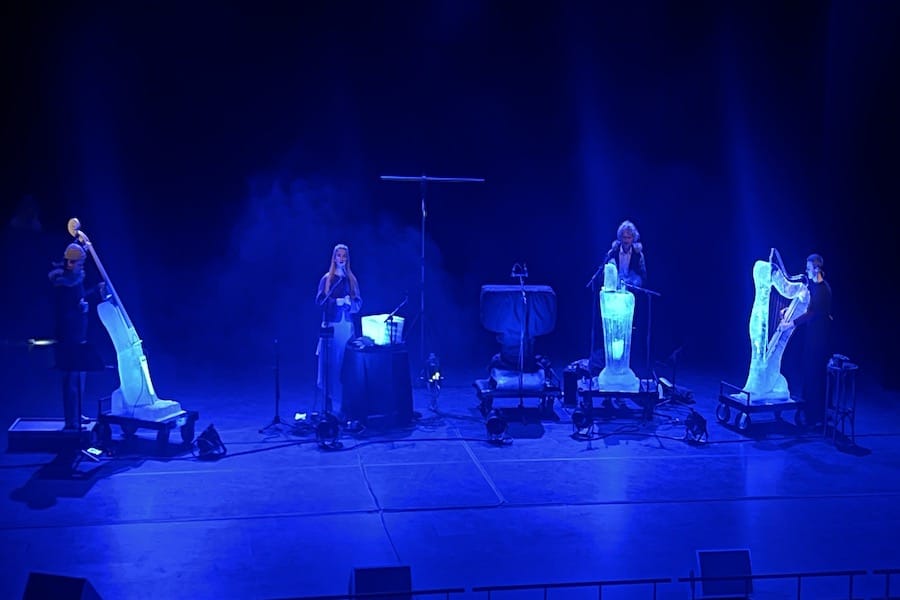Review: Terje Isungset’s Ice Quartet at RNCM is ‘beautiful, eerie and otherworldly’
- Written by Thom Bamford
- Last updated 1 year ago
- City of Manchester, Music

In a mesmerising fusion of innovation, environmental consciousness, and artistic brilliance, Terje Isungset, the renowned Norwegian percussionist and pioneer of Ice Music, enchanted the audience at the Royal Northern College of Music on Friday Night.
Isungset, celebrated globally since 1999 for his groundbreaking work in crafting instruments from natural ice, showcased his exceptional talent alongside his quartet, creating a captivating and ethereal musical landscape.
Sat amongst the hubbub of the crowd before the gig started; patrons were asking questions like, will it be cold? What’s going to happen? Should I have bought a coat?
They needn’t have worried as the ethereal and otherworldly music of the quartet drifted amongst those there, warming everyone it came in touch with on a chilly November evening.
Terje Isungset Ice Quartet
Isungset’s commitment to nature and his unique approach to music were evident throughout the performance, as the quartet skill-fully played instruments such as ice harp, ice bass, ice percussion, and ice horns – all meticulously crafted from blocks of, you guessed it, natural ice.
The instruments, hand-carved by the award-winning ice sculptor Bill Covitz during Isungset’s annual Ice Music Festival in Norway, resonated with an otherworldly beauty that underscored the theme of the concert: a profound tribute to the magnificence of nature.
It was absolutely impossible not to be moved by the music, using unique methods to create percussive sounds, with eerie but strangely familiar timbres, the crunch of foot steps on snow, the ice horn ringing reminiscent of animal calls painting a strange and bleak landscape in the Winter scenes.
The quartet, comprised of Terje Isungset on ice drums, ice percussion, ice horns, and iceofone, Amalie Holt Kleive on vocals, ice percussion, and water, Julie Rokseth on the ice harp, and Toivo Fjose on ice bass, delivered a performance that was as visually stunning as it was sonically captivating.
The addition of Mathias Grønsdal on sound design and Ina Charlotte Moe handling ice logistics enhanced the overall experience, ensuring a seamless and immersive journey into the realm of ice-inspired music.
Eco Friendly Music
Isungset’s narrative of his journey into ice music, shared with the audience, added a personal touch to the performance.
His commitment to environmental sustainability was palpable, as he emphasised the eco-friendly nature of his instruments, describing them as not only artistically significant but also remarkably healthy – a testament to the purity of the natural ice used in their creation.
The concert drew from Isungset’s albums “Winter Songs” and “Beauty of Winter,” interweaving familiar melodies with brand-new compositions.
Each piece showcased the unique tones of the ice instruments, highlighting the depth and versatility of this unconventional medium.
Isungset’s assertion that each piece of ice has a distinct tone added an element of unpredictability to the performance, mirroring the ever-changing nature of the lakes from which the ice is harvested.
The connection between Isungset’s artistry and his environmental activism was particularly poignant, as he reflected on his Ocean Memories project in collaboration with Greenpeace.
This intersection of music and environmental consciousness resonated deeply, inviting the audience to contemplate the significance of utilising natural elements in a musical setting.
Talking of going green, RNCM, the venue for the gig is currently on a green journey of their own.
RNCMS The Future is Green
The Future is Green program at the Royal Northern College of Music (RNCM) is a groundbreaking initiative that underscores the institution’s commitment to environmental sustainability and climate action.
Rooted in a bold declaration of a climate emergency, RNCM has embarked on a transformative journey to redefine§ the role of musicians and artists in addressing the global climate crisis.
The program encompasses a multifaceted approach, with the institution divesting from fossil fuels and working tirelessly towards achieving full heat decarbonisation by 2038.
This ambitious goal aligns with Greater Manchester’s net-zero carbon targets, demonstrating RNCM’s dedication to making a tangible impact on a local and global scale.
At the heart of The Future is Green is RNCM Climate Action, a society founded by students and staff two years ago, focused on fostering sustainability and eco-friendliness within the RNCM community.
The program recognises the power of student voices and aims to nurture a sustainable ethos within the institution, setting an inspiring example for other conservatoires to follow.
RNCM’s sustainability journey is not a recent development, as evidenced by their Carbon Management Plan since 2010 and the adoption of a Sustainability 2032 Framework. With dedicated efforts, RNCM has already achieved significant milestones, including saving 877 tonnes of carbon by 2020 and securing funding for the Public Sector Decarbonisation Scheme.
All in all, this was a night of music so different, beautiful and mesmerising it will live long in the memory of those who were there.
Eerily beautiful, haunting, otherworldly yet so comforting, it was a fantastic evening and if the quartet come back to Manchester, you have to go and see it to believe it.
You can see some of the other amazing shows on at RNCM by clicking here
- This article was last updated 1 year ago.
- It was first published on 13 November 2023 and is subject to be updated from time to time. Please refresh or return to see the latest version.
Did we miss something? Let us know: [email protected]
Want to be the first to receive all the latest news stories, what’s on and events from the heart of Manchester? Sign up here.
Manchester is a successful city, but many people suffer. I Love Manchester helps raise awareness and funds to help improve the lives and prospects of people across Greater Manchester – and we can’t do it without your help. So please support us with what you can so we can continue to spread the love. Thank you in advance!
An email you’ll love. Subscribe to our newsletter to get the latest news stories delivered direct to your inbox.
Got a story worth sharing?
What’s the story? We are all ears when it comes to positive news and inspiring stories. You can send story ideas to [email protected]
While we can’t guarantee to publish everything, we will always consider any enquiry or idea that promotes:
- Independent new openings
- Human interest
- Not-for-profit organisations
- Community Interest Companies (CiCs) and projects
- Charities and charitable initiatives
- Affordability and offers saving people over 20%
For anything else, don’t hesitate to get in touch with us about advertorials (from £350+VAT) and advertising opportunities: [email protected]

Old nightclub at the heart of ‘Staly Vegas’ could be transformed into new food hall

How Sounds from the Other City became the UK’s most unforgettable independent festival

The shared ownership scheme that gave Fiona the family home she always wanted

How shared ownership can get you on the property ladder in 2025

Review: Strictly Come Dancing at the AO Arena is ‘joyous, slick and strictly brilliant’
















